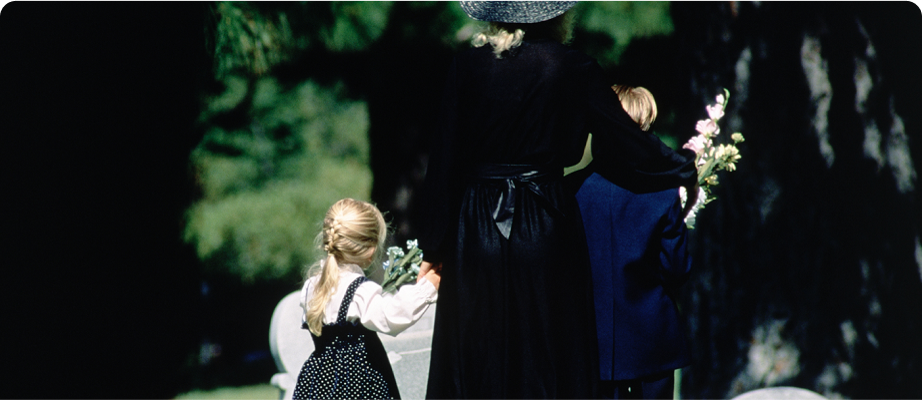Advice Center
Get tips and explore common end-of-life topics.

How to Guide Children Through Grief and Loss
Grief is one of the most difficult emotions to process - especially when brought on by the death of a loved one.
Grief challenges us because it doesn’t have the arc of a typical emotion. Often, it comes in waves and can be triggered long after a death occurs. This is especially true in children.
For children who have yet to experience a loss, grief can be a completely new emotion. And, as a parent or next of kin, you’re called upon to help them navigate these new feelings and understand the implications of death, all while doing your own share of grieving.
The ways in which we guide our children through grief define how they understand death and process their new feelings.
Preparing before a loss
Like anything, a solid foundation of understanding can be an immense help for later learning.
It’s best to start explaining death to children before they experience loss first-hand.
You can point out examples in nature, such as plants that are dying. Explain that means those plants won’t be alive and growing like the other plants anymore. Or, use examples like the death of a neighbor’s pet. Often the death of a pet at home will trigger similar feelings in children to the death of an adult.
It’s important for children to understand what death is and the permanence of death.
Death isn’t an uncommon plotline in children’s movies and television. This can be an easy way to start explaining death and working the concept into regular life. Take examples from shows they might like and bring that up while watching with them. Shows and movies like Up, The Lion King, Sesame Street or Coco all tackle the topics of death and loss. There are also books like Charlotte’s Web, The Goodbye Book or Grandad’s Island.
With the understanding of death and the permanence of death, you give your child a frame of reference when the loss of a loved one happens.
You’re then able to share that example with your child and relate it to an experience you’ve already shared with them.
Above all, be direct
Death is a difficult topic - regardless of what stage of life we’re in.
That’s why euphemisms like “moved on,” “passed away” or “in a better place” have become common phrases when explaining a loss.
Children are often very literal so it’s best to avoid euphemisms altogether. Being direct and explaining that someone died, as well as explaining that death is permanent, is one of the best things you can do to help your child understand. This sets them up for continuing to understand the concept as they age, without reverting to ideas that someone may return or that someone has simply “moved on” for other reasons.
It’s best to tell them their loved one has died - using the terms, “_______ has died.” And explain that means they are no longer here with us, their body is no longer alive and that they won’t be coming back.
Follow this up by explaining to your child that it is OK to be sad. And, let them know that you feel sad, too. Explain that death is a natural part of life. You may also need to reassure them that this doesn’t mean they will die right away, or that you will die right away. You can also explain that it is not their fault or that nothing they did could have caused this.
Common ways children express grief
Often, children don't just express grief through words. They’ll show it in their behavior.
It’s important for you, and for your child, to understand that grief is perfectly natural and, although the realities of loss don’t go away, these feelings won’t always be so strong.
Here are some of the patterns and behaviors you may notice in a child after a loss:
- Talkative or boisterous children may become more quiet and reserved.
- Likewise, children who are typically quiet may become overly talkative and start talking more to fill empty space between conversations and activities.
- Children may have temper tantrums or find themselves easily frustrated. They may lash out at other children.
- They may appear fixated with talking about death or the loved one that was lost - and bring the conversation up at inappropriate times.
- Regressive behavior, such as baby talk or bed wetting is not uncommon .
- Recurrent questions about death, often expressed in worry of others dying, like “When will you die?” might be asked.
- They may exhibit clingy behavior, looking for extra attention and physical touch.
- Children may find it difficult to focus on tasks and schoolwork.
Should children attend funerals?
There is no easy answer to this question. In short, it depends on the child.
Funerals are an opportunity for closure and can be therapeutic for loved ones expressing grief. They may have that same effect on a child,but, only if the child is ready.
You might consider whether your child will be able to react appropriately and sit still at the funeral, treating it with the same respect other attendees would. This is out of respect for other family members.
If you feel your child is emotionally mature enough to handle a funeral, the best thing you can do is explain the event to them in full beforehand. Let them know what to expect so they are emotionally prepared:
- They may see other people crying and they need to know it’s OK for those people to be crying.
- They may cry themselves and that’s OK, too.
- Explain that sometimes people smile or laugh when they think of happy memories about their loved one, but that doesn’t mean they are happy they are gone.
- Their loved one’s body may be in the room. If it is a wake, they can go up to the casket if they are comfortable, but they don’t have to.
- Describe the funeral space to them in detail so they know where to feel most comfortable. Also, explain who will be there so they know who to expect and which trusted loved ones they might be able to see.
As a parent or guardian, one of the best things you can do for yourself and your child at a funeral is ensure they have someone who is dedicated to looking out for them and handling their feelings. If you can’t be that person, appoint a trusted person who is close to them.
Helping children process grief, by age:
Ages 1 - 2
- Children who are two or younger are often unable to express their feelings in words, though they can still feel grief or experience the absence that comes with losing someone.
- At this age, children are more physically expressive and helping them through their grief with hugs and holding them can be one of the best ways to help them process grief.
Ages 3 - 5
- Children at this age are beginning to express themselves through words and they start to understand and retain information.
- Because their comprehension skills are newly developing, be direct and brief when explaining the loss of a loved one to them. Explain what the death means for them and assure them that it is perfectly normal to feel the sadness they do.
- Often, children at this age have difficulty separating some of their ideas from reality. They may wonder if they are to blame or if they did something wrong to make a lost loved one leave.
- Children at this age may not understand the permanence of death and you may have to remind them from time-to-time that their loved one isn’t coming back.
- They may express fear of death or wonder if the same manner of death will happen to them. They may become afraid of germs or hospitals.
Ages 6 - 10
- At this age, children are inquisitive and start to form their own ideas of things. They may go on “fact-finding” missions and try to understand exactly why the death occurred.
- They may continue to experience grief, anxiety or bouts of crying long after the death occurs. Often, children’s grieving process is long and can be triggered by other moments of sadness, or even other deaths.
- Children at this age may also place blame on themselves or wonder if their behavior impacted the loss in any way.
- They may ask a lot of questions about the body or what happens to a person after death. Be direct and respond truthfully, avoiding euphemisms.
- They may have a fear of death and a fear of other loved ones dying.
Ages 10 and up
- As children evolve into preteens and teens, they begin to process death more like adults.
- Ensure your child is taking the time to properly process their grief and not just putting on a brave face or covering their sadness with humor.
- In their teen years, they may express their feelings to friends rather than family members.
- They may have difficulty focusing on school when grief is at its peak.
When it comes to approaching grief and loss with children, understand that every child is different. Balance a direct approach with sympathy. Try to put yourself in their shoes and remember how early loss may have impacted you. Exercise patience and lean in when they need your support.
Sources:
https://myhealth.alberta.ca/Health/aftercareinformation/pages/conditions.aspx?hwid=zp4435
https://www.parents.com/toddlers-preschoolers/development/social/talking-to-kids-about-death/
https://www.focusonthefamily.ca/content/when-a-loved-one-dies-understanding-grief-in-children
https://kidshealth.org/en/parents/death.html
https://www.cbc.ca/parents/learning/view/9-books-to-help-kids-understand-death
ttps://www.psychologytoday.com/ca/blog/good-mourning/201805/should-children-attend-funerals
Author(s): My Coda's Editorial Team
